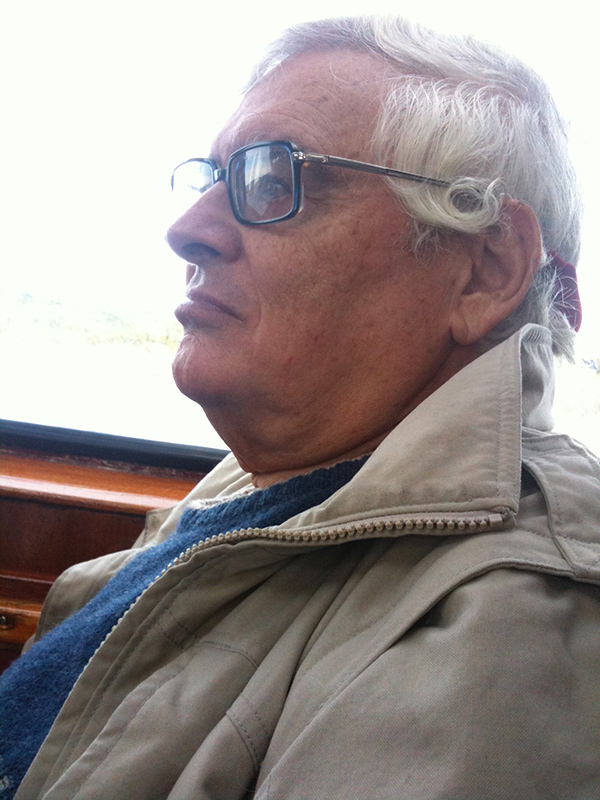Obituary: Jerry Fodor, Rutgers University Philosopher, Pioneer of Cognitive Science
Among the late 20th and early 21st centuries’ “Most Important Philosophers of Mind”

Renowned Rutgers scholar Jerry Fodor, typically seen as one of the most important and influential philosophers of mind of the late 20th and early 21st centuries, died November 29 at his home in New York City after a long illness.
Jerry Alan Fodor was State of New Jersey Professor Emeritus of Philosophy and Cognitive Science at Rutgers University-New Brunswick. He taught at Rutgers from 1988 until his retirement in 2012.
Noam Chomsky, the world-renowned linguist, philosopher and rationalist, said, “Jerry Fodor was one of the founders of contemporary cognitive science and a leader in its development over the years, and a major figure in contemporary philosophy of language and mind. His highly innovative contributions have had a broad influence as well in linguistics and psychology of language. His computational-representational theory of mind has for years been the gold standard in the field. His analyses of concepts and of the role of 'language of thought' are unsurpassed in their depth and import. Always with sparkling wit and style. A wonderful person and valued friend for 60 years.”
Born in New York City in 1935, Fodor attended Columbia University, graduating in 1956, and received his Ph.D. in philosophy from Princeton University in 1960. He taught at the Massachusetts Institute of Technology from 1959 to 1986, moving then to the City University of New York and to Rutgers in 1988. His move to Rutgers “signaled to the world that the Rutgers Philosophy Department was aiming to be among the premier departments in the world,” said Ernest Lepore, Fodor’s colleague in the Department of Philosophy and his frequent collaborator on many articles and two books. Fodor founded the Rutgers University Center for Cognitive Science and immediately began to attract renowned scholars both to the center and to the Philosophy Department.
“He was a philosophical rock star,” said Lepore, whose 1992 and 1993 books with Fodor argued “meaning holism” – the claim, dominant at that time, that the meanings of all of the words in a language are interdependent. “He started off as a philosopher of language in the 1960s, moving largely to philosophy of mind, and pretty much creating the field of cognitive science along the way.”
Barry Loewer, chair of the Department of Philosophy and director of the Rutgers Center for Philosophy and the Sciences, said, “Jerry was the wittiest and liveliest thinker and writer I have ever known. Starting in the 1970s, he revolutionized philosophy of mind by undoing the then-prevalent behaviorist and Wittgensteinian consensus and showing how cognitive science can explain and naturalize thought and thinking.”
Fodor was the author of a number of highly influential books as well as numerous articles. Among the most influential were his groundbreaking book, The Language of Thought, published in 1975, and Modularity of Mind, published in 1983. In the first of those books, he develops his language-of-thought theory, an empirical hypothesis about the nature of thought, on which thought has the structure of a language-like compositional system of symbolic representations, which are physically realized in the brain. The second of those books lays out his highly influential modularity hypothesis about the architecture of the mind, on which the mind is structured into innate neural structures that evolved to have specific designated functions. These modules are independent of one another and also of the general processing system responsible for cognition. The upshot is that cognition cannot affect much of what happens in the modules, such as early perceptual processes.
“It is hard to overstate the impact of these ideas on the subsequent debates in philosophy of mind and language, in cognitive and developmental psychology, and in cognitive science, both on the many researchers who agreed with Fodor and on those who opposed his views,” Lepore said. “Nobody working in these areas could ignore this work.”
Those positions, and a number of others Fodor defended in his career, were controversial and hotly debated among psychologists, neuroscientists, biologists and philosophers. But few, if any, philosophers were better equipped to defend a controversial position than Fodor, both on theoretical grounds and with respect to empirical findings. Fodor was known as a powerful opponent in philosophical debate; researchers quickly learned that they had to be ready for something stronger than mere applause when they delivered a talk with Fodor in the audience. “He could be rough in debate,” Lepore said. “But it was never personal. And he was also very modest. If you came up to him and said, ‘Hey, I read your paper and thought it was really good,’ he would blush.”
Fodor was not daunted by the reputation of persons – or, for that matter, of places. In 2010, he was invited to speak on Charles Darwin in Darwin Hall at the University of London. He had come to believe that Darwin’s theory of natural selection was “inherently flawed and…it can’t be fixed,” as he put it in a 2011 talk at the University of California-Santa Barbara. He and biologist Massimo Piatelli-Palmarini wrote What Darwin Got Wrong (2010), reviewed favorably by a number of biologists. “He began his talk at Darwin Hall at the University of London by saying, ‘I’m here to perform an exorcism,’” Lepore remembered, laughing. “It was very Jersey.”
Fodor was the author or co-author of 12 books, all highly influential, including The Language of Thought (1975), Modularity of Mind (1983), Psychosemantics (1987), his Jean Nicod Lectures, The Elm and the Expert (1994), his John Locke Lectures, Concepts: Where Cognitive Science Went Wrong (1998), and LOT 2: The Language of Thought Revisited in 2008.
Fodor is survived by his wife, Janet Dean Fodor, Distinguished Professor of Linguistics at the City University of New York; by their daughter, Kate Fodor, in Maplewood, New Jersey, a playwright and television writer; a son, Anthony Fodor, a professor of bioinformatics and genomics at the University of North Carolina, Charlotte; and three grandchildren.